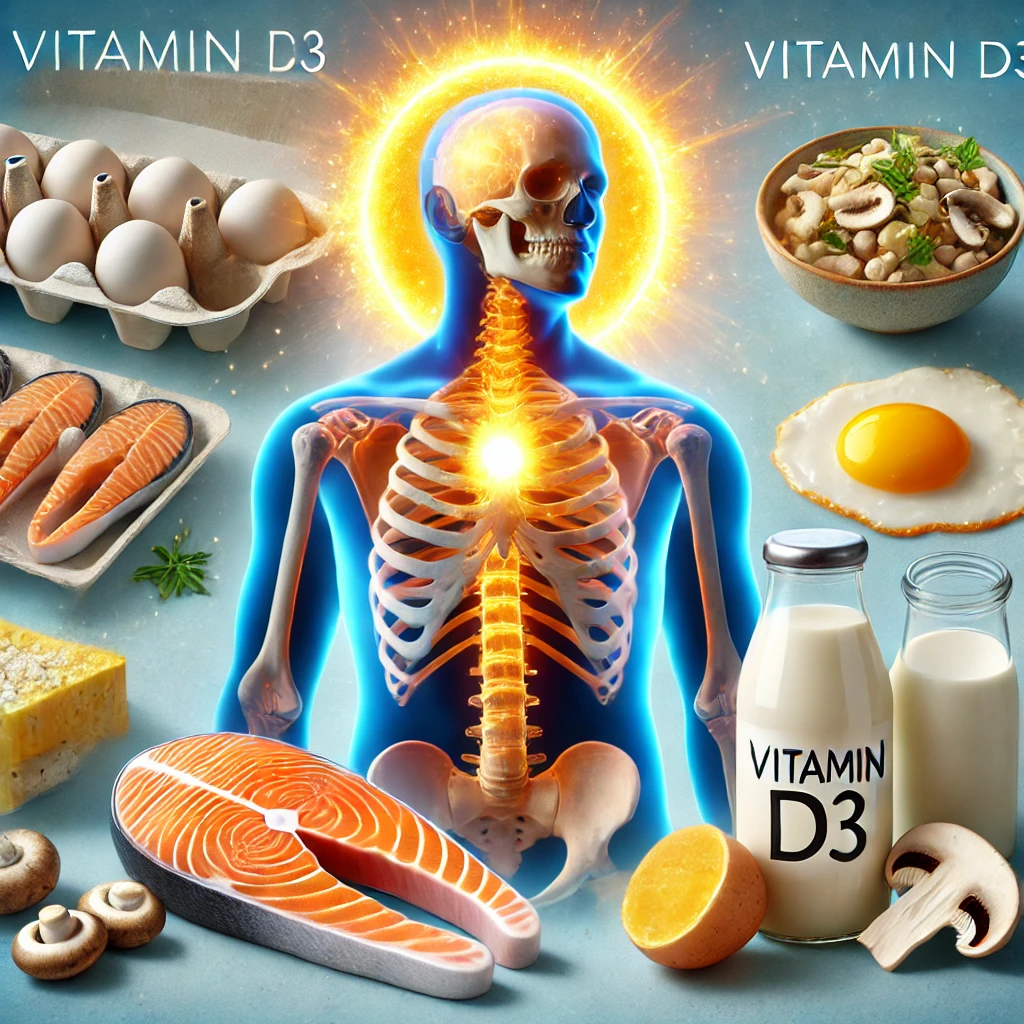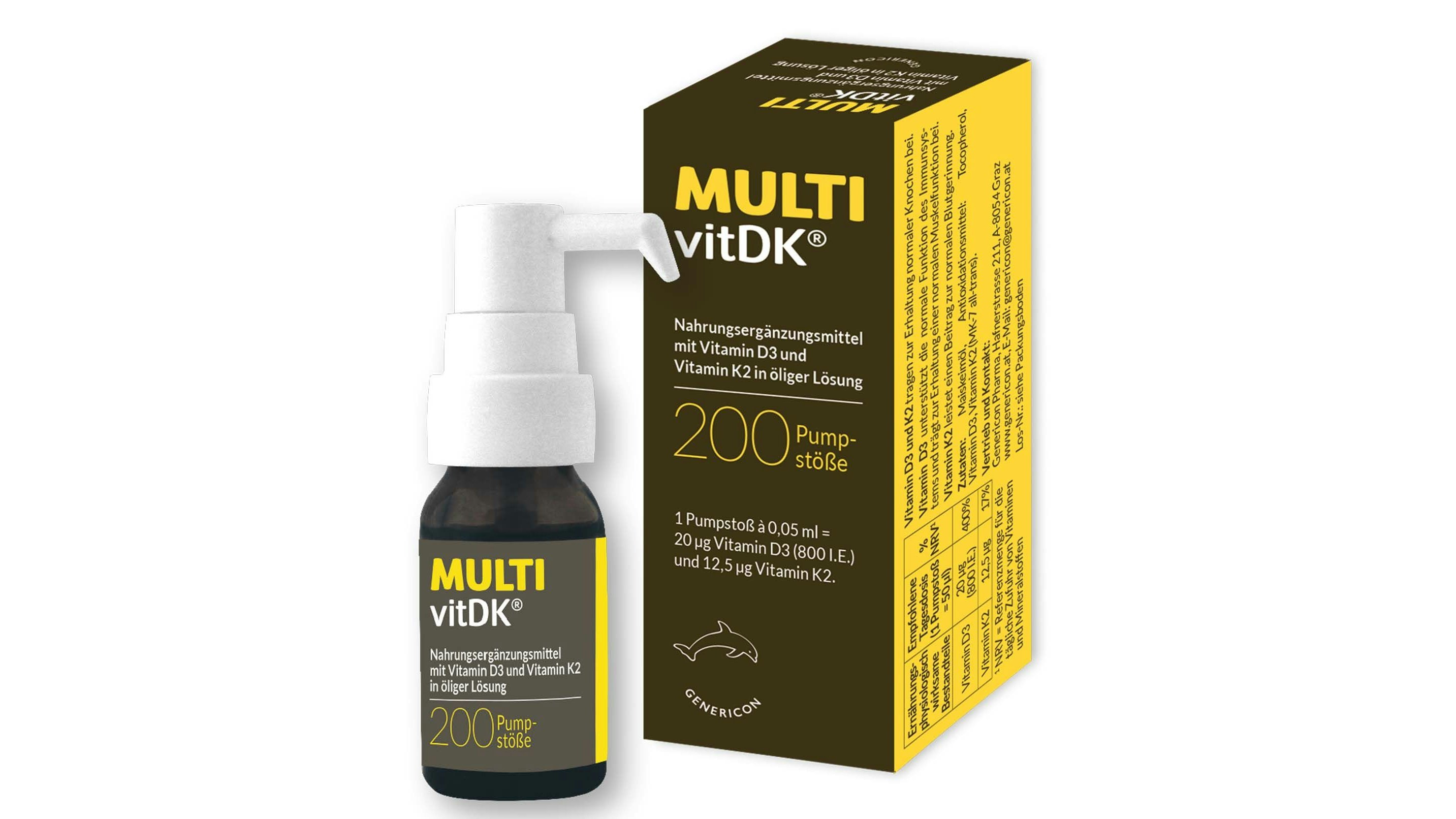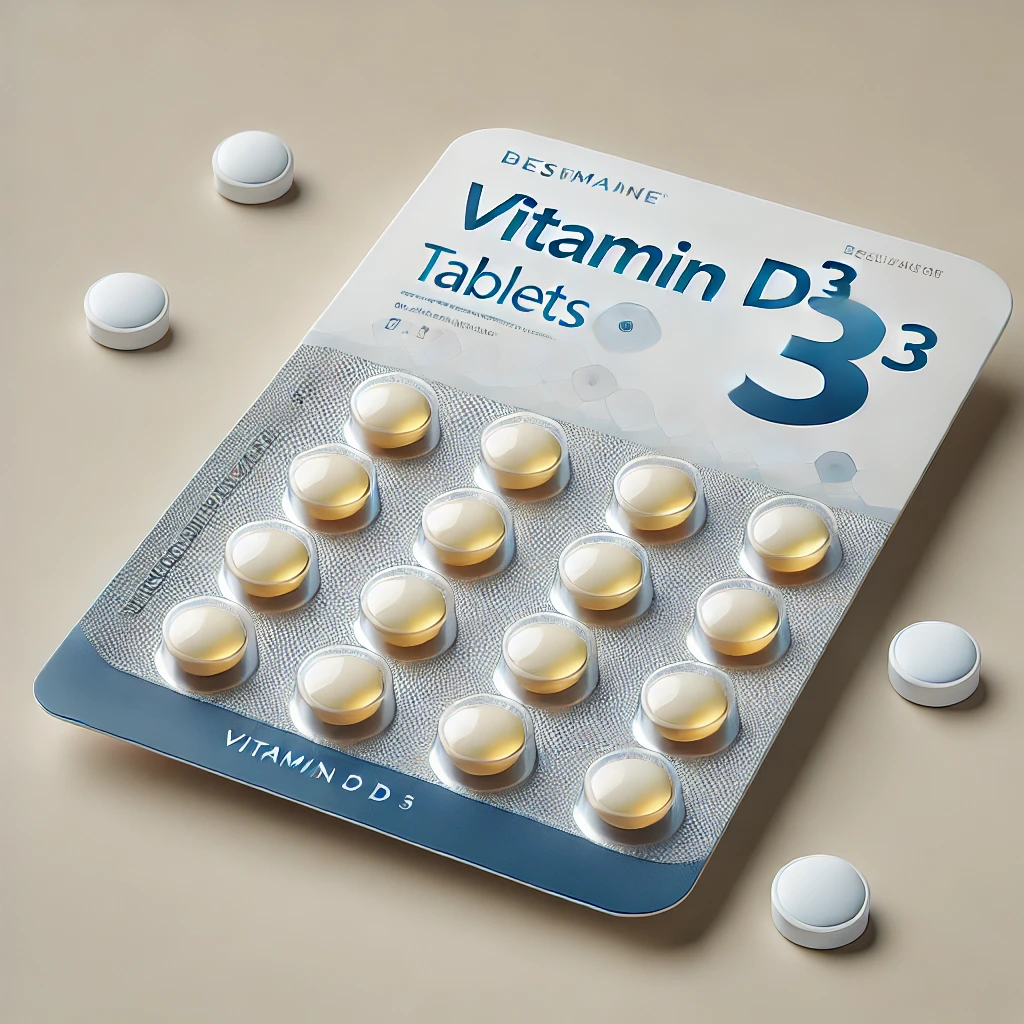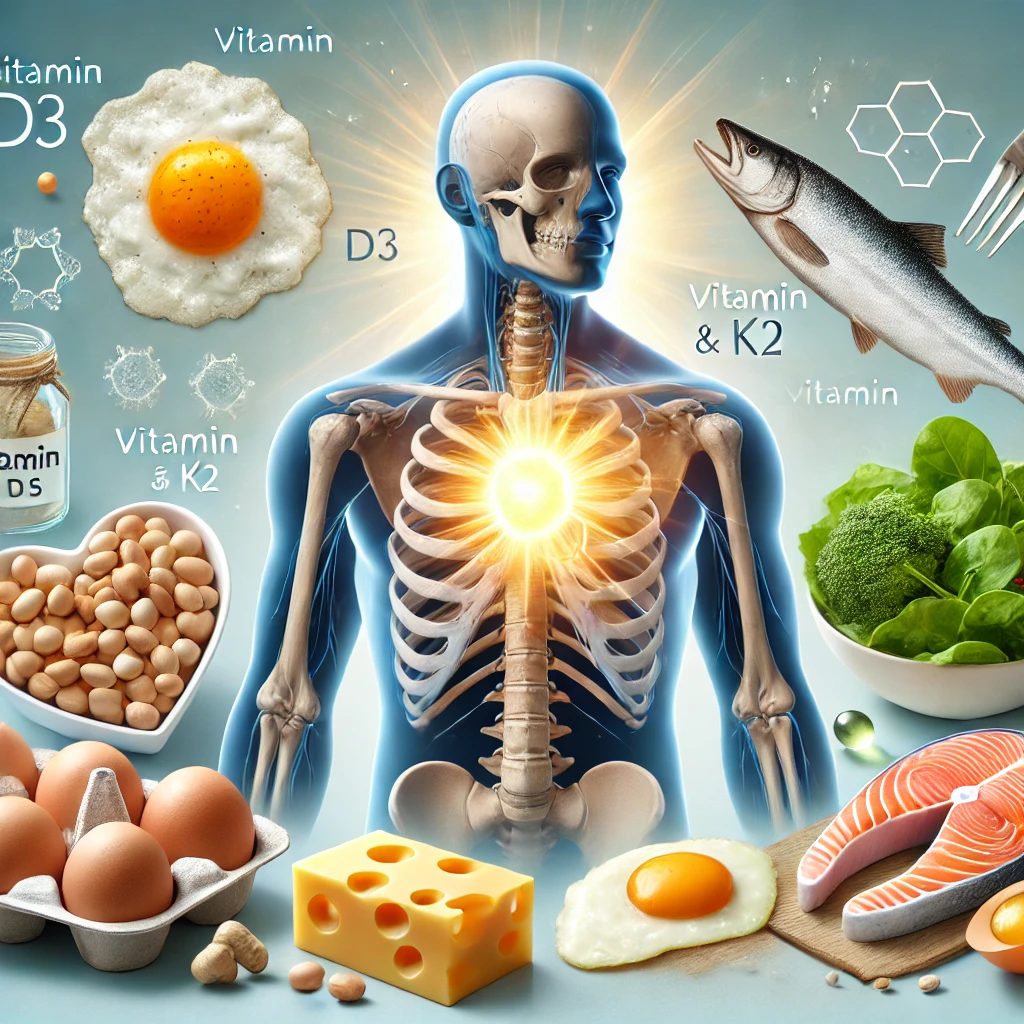Table of Contents
INTRODUCTION
Vitamins play a crucial role in maintaining overall health, and when it comes to supporting your bones and heart, Vitamin D3 K2 is a powerhouse combination. These two essential nutrients work in harmony to strengthen your bones while protecting your cardiovascular system—a benefit you might miss if you take them separately.
VITAMIN D3 K2 is responsible for helping your body absorb calcium, a vital mineral for maintaining strong bones and healthy teeth. However, calcium needs direction. Without Vitamin K2, this calcium can deposit in places it shouldn’t—like your arteries—leading to potential heart problems. Vitamin K2 acts like a traffic controller, ensuring calcium travels to your bones and teeth where it’s needed most, not your blood vessels.
Many people supplement with VITAMIN D3 K2 alone, thinking it’s enough for bone health. But without Vitamin K2, that calcium might do more harm than good. That’s why Vitamin D3 K2 together offer a more complete, safe, and effective approach to improving bone density and reducing arterial calcification.
In this comprehensive guide, we’ll dive into why Vitamin D3 K2 is the perfect pair, explore their individual and combined benefits, identify natural sources, and provide actionable tips to help you get the most out of this essential nutrient duo.
WHAT IS VITAMIN D3?
Vitamin D3, also known as cholecalciferol, is a fat-soluble vitamin that plays a key role in regulating calcium and phosphorus in your body. It’s primarily synthesized when your skin is exposed to sunlight, but it can also be obtained through certain foods and dietary supplements. Vitamin D3 is essential for bone development, immune support, and overall metabolic function, making it an indispensable part of the Vitamin D3 K2 team.
BENEFITS OF VITAMIN D3
The benefits of Vitamin D3, especially when paired with Vitamin K2, include:
- Enhanced calcium absorption, crucial for strong and healthy bones.
- Immune system support, helping your body fight off infections and viruses.
- Reduced risk of osteoporosis, bone loss, and fractures, particularly in older adults.
- Mood stabilization, potentially reducing symptoms of depression and seasonal affective disorder.
- Improved muscle function, lowering the risk of falls and injury in aging individuals.
- Prevention of chronic diseases, including certain autoimmune and inflammatory conditions.
- Better insulin regulation, which may decrease the risk of developing type 2 diabetes.
- Support for lung and heart health, especially when combined with Vitamin K2 to manage calcium distribution.

SOURCES OF VITAMIN D3
- Vitamin D3 is essential for maintaining optimal health, playing a key role in bone health, immune function, and overall well-being. One of the easiest ways to obtain this vital nutrient is through natural sources.
- 1. Sunlight Exposure: Your Natural Source of Vitamin D3
- One of the most effective ways to get vitamin D3 is by soaking up some sunlight. Spending just 10–30 minutes outdoors a few times a week is enough to stimulate vitamin D production in the skin. Sunlight exposure allows the body to naturally synthesize this vitamin, making it the most accessible and cost-effective source. However, the amount of sunlight needed can vary depending on skin tone, geographical location, and the time of year.
- 2. Foods Rich in Vitamin D3
- If you’re looking to boost your vitamin D3 levels through diet, consider adding the following foods to your meals:
- Fatty Fish: Salmon, mackerel, and sardines are rich in vitamin D3, providing essential nutrients to support bone and immune health.
- Egg Yolks: While you may need to consume several yolks, they provide a natural source of vitamin D3.
- Fortified Dairy Products: Many dairy products like milk and yogurt are fortified with vitamin D, which can help bridge any gaps in your diet.
- Beef Liver: Although not a common food in many diets, beef liver is an excellent source of vitamin D3 and other vital nutrients.
- 3. Vitamin D3 Supplements
- For individuals with limited sun exposure or those who live in regions with long winters, vitamin D3 supplements are a practical solution. Taking a supplement can ensure that you meet your vitamin D needs, especially if you’re at risk for deficiency. It’s always recommended to consult with a healthcare provider before starting supplementation to determine the appropriate dosage for your specific needs.
- 4. Mushrooms: A Natural Plant-Based Source of Vitamin D3
- Mushrooms that are exposed to sunlight or ultraviolet (UV) light contain natural vitamin D3. Varieties like maitake and shiitake mushrooms are good examples. While plant-based foods typically contain vitamin D2 (which is not as effective as D3), these mushrooms are a rare exception, making them an excellent choice for vegetarians or those seeking alternative sources of vitamin D3.
SIGNS OF VITAMIN D3 DEFICIENCY
VITAMIN D3 K2 deficiency can manifest in several ways. Here are some common signs that may indicate you’re not getting enough vitamin D3:
- Weak Bones and Muscle Pain: Low levels of vitamin D3 can lead to bone pain and muscle weakness, increasing the risk of fractures.
- Frequent Colds and Infections: Since vitamin D plays a crucial role in immune health, deficiency can make you more susceptible to illnesses.
- Fatigue and Low Energy: Feeling tired or experiencing chronic fatigue could be linked to insufficient vitamin D levels.
- Mood Swings or Depression: Vitamin D3 is associated with the production of serotonin, and a deficiency may contribute to mood disorders or depression.
- Higher Risk of Fractures: With inadequate vitamin D3, bones become brittle and more prone to breaks.
- Slow Wound Healing: Insufficient vitamin D can slow down the body’s ability to heal wounds effectively.
- Hair Thinning or Loss: Some research suggests that vitamin D3 deficiency can contribute to hair thinning or even hair loss.

WHAT IS VITAMIN K2?
Vitamin K2 is an essential fat-soluble vitamin that plays a critical role in calcium metabolism. While vitamin K1 is primarily involved in blood clotting, vitamin K2 directs calcium to the bones and teeth and helps prevent its buildup in the arteries and soft tissues.
BENEFITS OF VITAMIN K2
Vitamin K2 offers numerous health benefits that are essential for maintaining a healthy body. Here’s a deeper dive into the key benefits:
- Supports Bone and Dental Health: Vitamin K2 helps ensure that calcium is directed to the bones and teeth, enhancing their strength and density. This reduces the risk of bone fractures and dental issues.
- Prevents Calcium Buildup in Arteries: One of the most significant advantages of vitamin K2 is its ability to prevent calcium from accumulating in the arteries. This helps reduce the risk of cardiovascular diseases such as heart disease and stroke.
- Improves Brain Function: Research indicates that vitamin K2 may help improve cognitive function and reduce the risk of memory loss and neurodegenerative diseases.
- Enhances Insulin Sensitivity: Vitamin K2 has been linked to improved insulin sensitivity, which may lower the risk of diabetes by helping the body utilize glucose more effectively.
- Reduces Inflammation: Chronic inflammation is linked to many health conditions, including heart disease and arthritis. Vitamin K2 has anti-inflammatory effects, helping protect against these chronic diseases.
- Prevents Kidney Calcification: By regulating calcium distribution, vitamin K2 helps prevent the formation of calcium deposits in the kidneys, reducing the risk of kidney stones.
- May Lower Cancer Risk: Studies suggest that vitamin K2 may have protective properties against certain types of cancer, although more research is needed to establish definitive links.
SOURCES OF VITAMIN K2
Vitamin K2 can be found in various foods, particularly fermented and animal-based products. Here are some of the best sources:
- Fermented Foods: Fermented soybeans (natto), sauerkraut, kimchi, and miso are rich in vitamin K2.
- Animal Products: Grass-fed dairy, egg yolks, liver, and meat are excellent sources of vitamin K2.
- Cheese: Hard cheeses like Gouda, Brie, and Edam are packed with vitamin K2, especially when they are made from grass-fed cows.
- Supplements: Vitamin K2 supplements, often combined with vitamin D3, are available for those who may have a deficiency or want to ensure adequate intake.
SIGNS OF VITAMIN K2 DEFICIENCY
Vitamin K2 deficiency is rare but can cause significant health issues. Here are some common signs:
- Easy Bruising and Excessive Bleeding: Vitamin K2 plays a role in blood clotting, so a deficiency may lead to unexplained bruising or excessive bleeding.
- Weak Bones and Increased Fracture Risk: Without enough vitamin K2, calcium cannot be efficiently directed to bones, leading to brittle bones and a higher risk of fractures.
- Calcium Buildup in Arteries: A lack of vitamin K2 may result in calcium deposits in the arteries, increasing the risk of heart disease and stroke.
- Dental Issues: Insufficient vitamin K2 can lead to weak enamel, cavities, and other dental problems.
- Higher Risk of Osteoporosis: Vitamin K2 helps in the mineralization of bones, and a deficiency can contribute to osteoporosis.
- Poor Circulation: A deficiency in vitamin K2 may lead to circulatory problems, such as varicose veins or poor blood flow.
By ensuring a balanced intake of both VITAMIN D3 K2, you can support your overall health, improve bone density, enhance cardiovascular health, and boost immune function.

WHY VITAMIN D3 K2 SHOULD BE TAKEN TOGETHER
VITAMIN D3 K2 work synergistically, meaning that when taken together, they offer greater benefits than when taken separately. Here’s why combining these two essential nutrients is crucial for optimal health:
1. Prevents Calcium Buildup in Arteries
Vitamin D3 plays a vital role in calcium absorption from the diet. However, without adequate Vitamin K2, the calcium that’s absorbed may not be properly directed to the bones and teeth. Instead, it could deposit in arteries, leading to arterial calcification, a major risk factor for heart disease and stroke. Vitamin K2 ensures that calcium is transported to the right places—bones and teeth—where it strengthens them, preventing harmful calcium buildup in soft tissues and arteries. This synergy between Vitamin D3 and K2 helps promote heart health and reduces the risk of cardiovascular issues.
2. Strengthens Bones
Both VITAMIN D3 K2 are critical for maintaining healthy bones. Vitamin D3 aids in the absorption of calcium, which is essential for bone health. However, it’s Vitamin K2 that directs calcium to the bones, ensuring that it is effectively utilized in bone formation. This joint action lowers the risk of fractures, supports bone density, and helps prevent conditions like osteoporosis. Taking these vitamins together provides optimal bone protection and strength.
3. Supports Heart Health
Research shows that Vitamin K2 plays a role in reducing arterial calcification, which is associated with an increased risk of heart disease. Vitamin D3 contributes to calcium absorption, but if left unchecked, excess calcium can accumulate in the arteries, leading to stiffness and heart problems. By pairing Vitamin D3 with Vitamin D3 K2, you ensure that calcium is directed to the bones, not the arteries, thus supporting healthy circulation and a strong heart. This partnership helps maintain a healthy cardiovascular system and reduces the risk of heart disease.
4. Boosts Immune System
VITAMIN D3 K2 is well-known for its immune-boosting properties, playing a crucial role in activating the body’s immune defenses. However, Vitamin K2 also has a lesser-known but important role in regulating inflammation. While Vitamin D3 strengthens the immune response, Vitamin K2 helps modulate inflammatory responses, ensuring the body remains in balance. This combination supports a more efficient immune system, reducing the risk of infections and chronic diseases.
5. Improves Dental Health
Both VITAMIN D3 K2 are beneficial for maintaining strong teeth. Vitamin D3 enhances calcium absorption, while Vitamin K2 ensures that calcium is deposited in teeth enamel, making them stronger and less prone to cavities. Additionally, Vitamin K2 works to prevent the calcification of soft tissues, including gums, ensuring better overall dental health. Together, these vitamins promote healthy teeth, preventing issues such as tooth decay and periodontal disease.
6. Enhances Longevity
Studies have shown that individuals who take Vitamin D3 and K2 together tend to enjoy better overall health and longevity. This is likely due to their combined effects on bone health, heart health, immune function, and inflammation regulation. By addressing several aspects of health at once, Vitamin D3 and K2 contribute to a higher quality of life and an increased lifespan. Regular intake of both vitamins can be part of a proactive approach to aging gracefully and maintaining health throughout the years.

FREQUENTLY ASKED QUESTIONS (FAQs)
1. Can I take Vitamin D3 without Vitamin K2?
While it’s technically possible to take Vitamin D3 without Vitamin K2, it is not recommended. Vitamin D3 helps your body absorb calcium, but without Vitamin K2, the calcium may be deposited in the arteries instead of the bones. This can increase the risk of cardiovascular problems, including heart disease and arterial calcification. Therefore, pairing Vitamin D3 with Vitamin K2 ensures that calcium is directed to the bones, where it is needed most, rather than accumulating in the blood vessels.
2. What is the best time to take Vitamin D3 K2?
For optimal absorption and effectiveness, Vitamin D3 and K2 should be taken with meals that contain healthy fats. Fat helps increase the bioavailability of fat-soluble vitamins like D3 and K2. The best time to take them is usually in the morning or early afternoon, as this can enhance the body’s ability to absorb these nutrients and support daytime energy levels. If you are taking them before bed, ensure it’s with a fat-containing meal to optimize absorption.
3. How long does it take for Vitamin D3 K2 to show results?
The time it takes to notice the benefits of Vitamin D3 and K2 can vary depending on individual factors, such as your current vitamin levels, diet, lifestyle, and health conditions. Generally, you may start to notice improvements in energy levels, bone strength, and immune function within a few weeks to a couple of months of consistent supplementation. However, for more significant changes, such as enhanced bone density or a decrease in arterial calcification, it may take several months.
4. What is the ideal dosage for Vitamin D3 K2?
The ideal dosage of Vitamin D3 and K2 can vary based on factors like age, health status, and individual needs. A common dosage for adults is 1000–5000 IU of Vitamin D3 per day and 90–200 mcg of Vitamin K2 (MK-7) daily. It is important to consult with a healthcare provider to determine the appropriate dosage for your specific requirements, especially if you have underlying medical conditions such as osteoporosis or cardiovascular disease.
5. Can I get enough Vitamin D3 K2 from food?
Getting sufficient amounts of Vitamin D3 and K2 from food alone can be challenging, as they are not present in large quantities in most foods. Vitamin D3 is found in fatty fish like salmon, mackerel, and sardines, while Vitamin K2 is present in fermented foods such as natto, sauerkraut, and certain cheeses. However, due to limited dietary sources, many people may not be able to meet the recommended intake through food alone. In such cases, Vitamin D3 and K2 supplements can be a useful addition to help bridge the gap.
6. Are there any side effects of taking Vitamin D3 K2?
When taken at the recommended doses, VITAMIN D3 K2 are generally considered safe with minimal risk of side effects. However, taking excessive amounts of Vitamin D3 can lead to vitamin toxicity, causing symptoms such as nausea, weakness, and kidney damage. Excessive Vitamin K2 intake is rare but could lead to issues with blood clotting. Always follow recommended dosages and consult a healthcare provider if you have concerns about side effects, particularly if you have any pre-existing conditions.
7. Is VITAMIN D3 K2 safe for children?
Yes, VITAMIN D3 K2 can be safe for children when administered in appropriate doses. Vitamin D3 plays a crucial role in bone growth and development in children, while Vitamin K2 helps ensure calcium is properly utilized in the bones and teeth. Ensure to follow pediatric dosages and consult with a pediatrician before starting supplementation, as children have specific nutritional requirements.

8. Can I take VITAMIN D3 K2 if I have a medical condition?
If you have a medical condition, especially related to blood clotting (like taking blood thinners) or kidney disease, it’s important to consult your healthcare provider before starting VITAMIN D3 K2 supplements. In some cases, these vitamins can interact with medications or affect existing conditions. For example, Vitamin K2 may interfere with anticoagulant medications, and Vitamin D3 can affect calcium levels in those with kidney issues. Always seek medical advice before introducing supplements into your routine if you have a health condition.
9. What are the benefits of Vitamin D3 K2 when taken together?
Vitamin D3 K2 work synergistically to support multiple aspects of health. Vitamin D3 aids in calcium absorption, while Vitamin K2 directs the calcium to the bones and teeth, preventing it from being deposited in arteries and soft tissues. This combination promotes better bone health, reduces the risk of cardiovascular disease, improves dental health, and may even enhance longevity. Together, they provide comprehensive support for bone density, cardiovascular health, and immune function.
10. How can VITAMIN D3 K2 support heart health?
VITAMIN D3 K2 play an important role in heart health by working together to regulate calcium balance in the body. While Vitamin D3 helps increase calcium absorption, Vitamin K2 ensures that calcium is deposited in bones and not in the arteries. This reduces the risk of arterial calcification, a factor that can contribute to heart disease. Proper levels of VITAMIN D3 K2 are essential for maintaining healthy blood vessels and optimal cardiovascular function.
11. What foods are good sources of Vitamin D3 and K2?
Vitamin D3 is found in foods like fatty fish (salmon, mackerel), fortified dairy products, and egg yolks. Vitamin K2 can be found in fermented foods such as natto (fermented soybeans), sauerkraut, and kimchi, as well as in animal products like grass-fed dairy, eggs, and organ meats. While food sources of both vitamins are beneficial, achieving optimal levels through diet alone can be difficult, so supplementation may be necessary for some individuals.
12. Can VITAMIN D3 K2 help with osteoporosis?
Yes, VITAMIN D3 K2 can significantly aid in the prevention and management of osteoporosis. Vitamin D3 enhances calcium absorption, while Vitamin K2 ensures that calcium is utilized effectively in bones, strengthening them and improving bone density. The combination of these two vitamins helps reduce the risk of fractures and supports overall bone health, making them essential for individuals with osteoporosis or those at risk.
13. How do VITAMIN D3 K2 support the immune system?
Vitamin D3 is essential for regulating immune system function by promoting the production of antimicrobial peptides, which help protect against infections. Vitamin K2 complements this by reducing inflammation and improving overall immune balance. Together, these vitamins help boost the body’s ability to fight off infections, reduce the risk of chronic disease, and maintain optimal immune function.
14. Is it possible to overdose on VITAMIN D3 K2?
While it is rare, it is possible to overdose on Vitamin D3, which can lead to elevated calcium levels, kidney problems, and other health issues. Vitamin K2 toxicity is much rarer, but excessive intake can potentially interfere with blood clotting processes. It is crucial to follow recommended dosages and consult with a healthcare provider if you are considering high-dose supplements. Always monitor your intake and avoid excessive amounts unless advised by your doctor.
15. Can VITAMIN D3 K2 help with mood and mental health?
Yes, both Vitamin D3 and K2 can have a positive impact on mood and mental health. Vitamin D3 is known to support the production of serotonin, a neurotransmitter that helps regulate mood and mental well-being. Vitamin K2 has been linked to improved brain function, potentially reducing the risk of cognitive decline and supporting mental clarity. Together, these vitamins help promote mental health, reduce symptoms of depression, and improve overall cognitive function.

SUMMARY OF THE LESSON
Taking Vitamin D3 and K2 together is essential for maintaining strong bones and a healthy heart. Vitamin D3 aids in the absorption of calcium, while Vitamin K2 ensures that calcium is properly directed to bones and teeth, rather than accumulating in the arteries.
Incorporating these vitamins into your diet or supplement routine can help you experience better bone health, a stronger cardiovascular system, and an overall improved quality of life. By optimizing calcium balance, Vitamin D3 and K2 provide long-term benefits for your body, supporting both bone density and heart function.
For our recent post click here






Take the supplement with meals that include fat for better absorption, ideally in the morning or afternoon. It may take several weeks to months to notice benefits like increased energy and stronger bones. While sun exposure and a diet rich in fatty fish, eggs, and cheese can help, supplements might still be necessary. Excessive intake can lead to calcium buildup or digestive issues, so stick to recommended doses. How can I ensure I’m getting enough of this supplement without overdoing it?
Great beat ! I would like to apprentice at the same time as you amend your website, how can i subscribe for a weblog site? The account aided me a appropriate deal. I have been tiny bit acquainted of this your broadcast offered vibrant transparent idea
I do agree with all the ideas you have presented in your post. They’re very convincing and will definitely work. Still, the posts are very short for newbies. Could you please extend them a bit from next time? Thanks for the post.
Thank you for sharing with us, I believe this website genuinely stands out : D.
I discovered your blog site on google and check a few of your early posts. Continue to keep up the very good operate. I just additional up your RSS feed to my MSN News Reader. Seeking forward to reading more from you later on!…
There are definitely numerous particulars like that to take into consideration. That may be a nice level to convey up. I supply the ideas above as normal inspiration however clearly there are questions just like the one you carry up the place crucial factor might be working in trustworthy good faith. I don?t know if greatest practices have emerged around things like that, however I’m certain that your job is clearly identified as a fair game. Both boys and girls feel the affect of just a moment’s pleasure, for the remainder of their lives.
I will immediately grab your rss as I can’t find your email subscription link or newsletter service. Do you’ve any? Please let me know in order that I could subscribe. Thanks.
excellent post.Never knew this, thankyou for letting me know.
Heya i am for the first time here. I found this board and I in finding It really useful & it helped me out a lot. I am hoping to offer something again and aid others such as you aided me.
The subsequent time I learn a weblog, I hope that it doesnt disappoint me as a lot as this one. I imply, I do know it was my option to learn, however I actually thought youd have something fascinating to say. All I hear is a bunch of whining about one thing that you possibly can repair for those who werent too busy in search of attention.
Very efficiently written story. It will be helpful to everyone who utilizes it, including yours truly :). Keep up the good work – i will definitely read more posts.
I really happy to find this site on bing, just what I was searching for : D also saved to fav.
I as well think so , perfectly written post! .
I’d have to examine with you here. Which is not one thing I usually do! I take pleasure in reading a post that may make folks think. Additionally, thanks for permitting me to comment!
At this time it appears like WordPress is the best blogging platform available right now. (from what I’ve read) Is that what you’re using on your blog?
Hi, i feel that i noticed you visited my site thus i got here to “go back the choose”.I’m attempting to find things to improve my website!I assume its ok to make use of a few of your ideas!!
I am also writing to let you be aware of of the remarkable discovery my wife’s daughter enjoyed browsing your webblog. She came to find a good number of pieces, not to mention what it is like to possess a marvelous teaching nature to make the rest just know precisely a number of hard to do subject matter. You actually surpassed visitors’ expected results. Thanks for offering such precious, trusted, revealing and in addition cool tips about this topic to Lizeth.
Great article and right to the point. I don’t know if this is really the best place to ask but do you folks have any ideea where to employ some professional writers? Thx 🙂
Triangagame, new to me! The site looks interesting. Anyone know what kind of games they offer? Give it a try and tell me! Get started at: triangagame
Its such as you learn my thoughts! You seem to grasp so much approximately this, like you wrote the e-book in it or something. I think that you simply could do with some p.c. to power the message house a bit, however instead of that, that is fantastic blog. An excellent read. I will definitely be back.
I have recently started a site, the info you provide on this web site has helped me greatly. Thank you for all of your time & work.
Great line up. We will be linking to this great article on our site. Keep up the good writing.
Normally I don’t read post on blogs, but I would like to say that this write-up very forced me to try and do it! Your writing style has been surprised me. Thanks, very nice post.
Good day! This post could not be written any better! Reading through this post reminds me of my old room mate! He always kept talking about this. I will forward this post to him. Fairly certain he will have a good read. Thank you for sharing!
What i do not understood is in fact how you’re no longer really a lot more well-appreciated than you may be now. You are very intelligent. You realize thus considerably relating to this topic, made me individually consider it from a lot of numerous angles. Its like men and women don’t seem to be interested unless it’s one thing to do with Girl gaga! Your personal stuffs outstanding. All the time deal with it up!
I don’t ordinarily comment but I gotta tell appreciate it for the post on this great one : D.
Who doesn’t love a freebie? Giftcode79club seems to have a decent selection of codes available. I’d check back often though to keep fresh. If you like freebies, check it out: giftcode79club
At this time it sounds like Drupal is the top blogging platform out there right now. (from what I’ve read) Is that what you’re using on your blog?
Good – I should certainly pronounce, impressed with your site. I had no trouble navigating through all tabs and related info ended up being truly simple to do to access. I recently found what I hoped for before you know it at all. Quite unusual. Is likely to appreciate it for those who add forums or something, web site theme . a tones way for your customer to communicate. Nice task.
Taya99comlogin, what up! Getting logged in is pretty smooth, no major hassles. Games are decent. I’ve seen better, but I’ve also seen way worse. Definitely worth a peek for a quick round. Peep it: taya99comlogin
I have been browsing on-line more than three hours these days, but I by no means discovered any attention-grabbing article like yours. It is lovely value enough for me. Personally, if all site owners and bloggers made good content as you did, the net shall be a lot more helpful than ever before.
Im not sure where you are getting your info, but great topic. I needs to spend some time studying much more or understanding more. Thanks for great information I used to be on the lookout for this information for my mission.
whoah this blog is magnificent i love reading your articles. Keep up the good work! You know, a lot of people are searching around for this info, you can aid them greatly.
Well done! This article provides a lot of value.
Okay, so I tried 969betapp the other day. Pretty smooth experience overall! Found some decent odds and the app was easy to navigate. Definitely worth checking out. 969betapp
certainly like your web-site but you need to check the spelling on quite a few of your posts. Several of them are rife with spelling problems and I in finding it very troublesome to inform the reality on the other hand I¦ll certainly come again again.